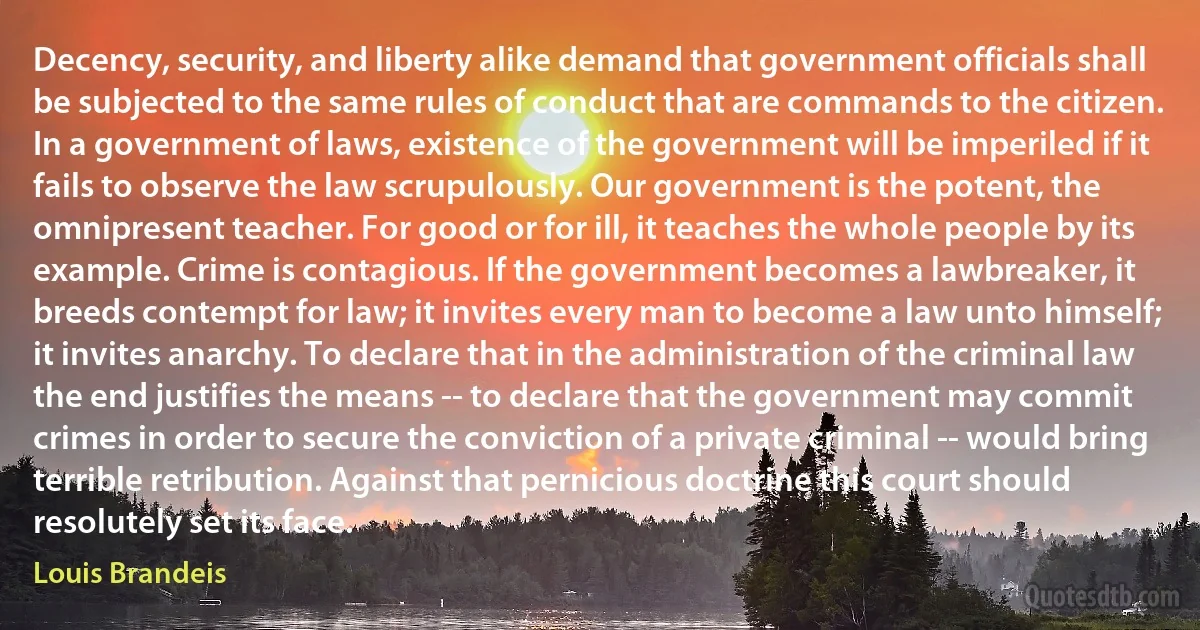
Decency, security, and liberty alike demand that government officials shall be subjected to the same rules of conduct that are commands to the citizen. In a government of laws, existence of the government will be imperiled if it fails to observe the law scrupulously. Our government is the potent, the omnipresent teacher. For good or for ill, it teaches the whole people by its example. Crime is contagious. If the government becomes a lawbreaker, it breeds contempt for law; it invites every man to become a law unto himself; it invites anarchy. To declare that in the administration of the criminal law the end justifies the means -- to declare that the government may commit crimes in order to secure the conviction of a private criminal -- would bring terrible retribution. Against that pernicious doctrine this court should resolutely set its face.
Louis BrandeisRelated topics
administration commit conduct contempt court crime doctrine end example face good government ill law liberty man observe order people security set should teacher means Laws RulesRelated quotes
In a capitalist democracy there are essentially two methods by which social choices can be made: voting, typically used to make ‘political' decisions, and the market mechanism, typically used to make ‘economic' decisions. In the emerging democracies with mixed economic systems Great Britain, France, and Scandinavia, the same two modes of making social choices prevail, though more scope is given to the method of voting and to decisions based directly or indirectly on it and less to the rule of the price mechanism. Elsewhere in the world, and even in smaller social units within the democracies, the social decisions are sometimes made by single individuals or small groups and sometimes (more and more rarely in this modern world) by a widely encompassing set of traditional rules for making the social choice in any given situation, for example, a religious code.

Kenneth Arrow
Upon completion of the centennial of your birth – and this time only – we have come to address some remarks at your graveside. We report to you, Rosh Betar, that Jerusalem, the city that has become bound together, the eternal capital of Israel and of the Land of Israel, shall not be subjected to any division and is our liberated and indivisible capital and so it shall remain from generation to generation.
The western part of the Land of Israel is entirely under our control and it shall not be partitioned anymore. No part of this land shall be given over to a foreign administration, to foreign sovereignty.
We believe that a day will come when the two parts of the Land of Israel shall establish, peacefully, in agreement and understanding a covenant of alliance, a free confederation, for the purpose of join cooperation.

Menachem Begin
For the government of the temporary magistrates of a democracy, or even the laws themselves may be as tyrannical as the maxims of the most despotic monarchy, and the administration of the government may be as destructive of private happiness. The only consolation that a democracy suggests in those circumstances is, that every member of the state has a chance of arriving at a share in the chief magistracy, and consequently of playing the tyrant in his turn; and as there is no government in the world so perfectly democratical, as that every member of the state, without exception, has a right of being admitted into the administration, great numbers will be in the same condition as if they had lived under the most absolute monarchy; and this is, in fact, almost universally the case with the poor, in all governments.

Joseph Priestley
"Today we have a very important case for the choice between obedience and disobedience because the nuclear arms race could lead to the most terrible war there has ever been, reducing Europe to complete destruction. Perhaps never as today to ‘disobey' is to obey the universal conscience; to disobey the written laws is to obey the unwritten law, which tells us to be united with all being; to disobey the cult of the present empires in the name of the community, which will tomorrow be really of everybody.
Conscientious objection is today evolving from being a personal stand in front of the terrible law to have to * "kill” human beings, to becoming a warning to everybody of the terrible danger of atomic destruction. This is a precise example of a disobedience, which would seem individual, and instead becomes a precious good for everyone.

Aldo Capitini
For what advantage is it, that the world enjoys profound peace, if thou art at war with thyself? This then is the peace we should keep. If we have it, nothing from without will be able to harm us. And to this end the public peace contributes no little: whence it is said, ‘That we may lead a quiet and peaceable life.' But if any one is disturbed when there is quiet, he is a miserable creature. Seest thou that He speaks of this peace which I call the third (inner, ed.) kind? Therefore when he has said, ‘that we may lead a quiet and peaceable life,' he does not stop there, but adds ‘in all godliness and honesty.' But we cannot live in godliness and honesty, unless that peace be established. For when curious reasonings disturb our faith, what peace is there? or when spirits of uncleanness, what peace is there?

John Chrysostom
